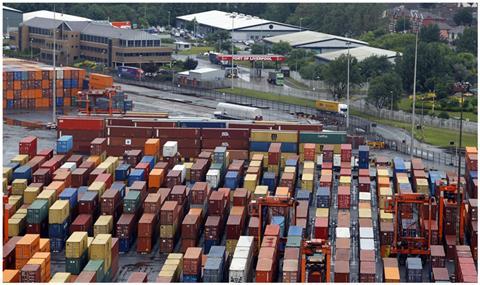
Hauliers could avoid Brexit border delays at the Channel Ports by sending freight unaccompanied via other locations, according to Peel Ports.
In a white paper dubbed Brexit Unlocked: A contingency option using uncongested ports, it argues that the best way to ensure cargo is not caught up in Brexit border delays is to switch non-perishable goods from accompanied freight services to unaccompanied freight services.
The paper says that this option would allow hauliers, manufacturers and retailers to avoid queues at the Channel Ports and to store contingency stock in trailers at less frequented ports such as London Medway.
The White Paper states: “Rather than store goods in a warehouse as contingency, manufacturers and retailers build contingency stock at the port of entry using stand trailers, removing the need for warehousing.
"As a result, organisations can deploy a Brexit contingency plan without committing to long-term storage costs, enabling them to retain flexibility, given the uncertainty of future trading relationships.”
Peel Ports, which operates London Medway, Liverpool, Clydeport and Heysham ports in the UK, said that using unaccompanied trailers, which may not be needed for a number of hours after arriving in port, would take the pressure of border force clearance services.
Read More
- A hard Brexit will see road transport industry face fleet and labour shortages, CILT warns
- Northern Ireland Affairs Committee demands more information on Brexit land border plans]#
- Warning of significant delays due to stricter border checks after Brexit
Another benefit would be improved productivity for hauliers since “drivers are not ‘idle’ on ferries”.
“Finally, as the shortest crossing time to benefit the accompanying driver is no longer the necessity, other routing options can be considered which may be lower carbon and more cost effective,” it adds.
The whitepaper points to Irish Sea freight, as an example, where more than 50% of the annual cargo is unaccompanied. This compares to 99% of annual cargo crossing the Dover Straits, which is accompanied.
“When looking at the wider market, the Dover Strait handles 4.3 million of the 6.6 million units that enter the UK from ports in France, Germany, Belgium and the Netherlands. Of these 6.6 million units, 4.8 million units – of 73% – are accompanied.
"If the Irish Sea market is an indicator, it is reasonable to assume around 50% could switch to unaccompanied trade,” the paper concludes.
Image: PA













